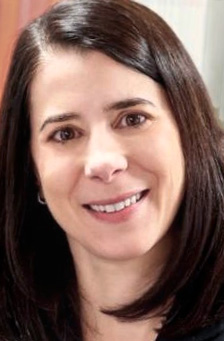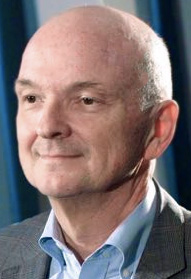

 M3AAWG, the Messaging, Malware, and Mobile, Anti-Abuse Working Group and APWG, the Anti-Phishing Working Group, surveyed their members about recent WHOIS changes. With over 300 results from security researchers, it's the broadest report yet on WHOIS use. The survey results confirm our concerns that WHOIS was a vital resource for security research, and its loss is a serious and ongoing problem. more
M3AAWG, the Messaging, Malware, and Mobile, Anti-Abuse Working Group and APWG, the Anti-Phishing Working Group, surveyed their members about recent WHOIS changes. With over 300 results from security researchers, it's the broadest report yet on WHOIS use. The survey results confirm our concerns that WHOIS was a vital resource for security research, and its loss is a serious and ongoing problem. more
 In the weeks leading up to ICANN63, CircleID in collaboration with ICANN invited community members to send their thoughts reflecting on the early days of ICANN and some of the points over the last 20 years that stand out in their memory. And the response was tremendous! Thank you, everyone, for your responses and thoughtful contributions. Below you will find the collection of blogs that we have featured in past weeks. Enjoy! more
In the weeks leading up to ICANN63, CircleID in collaboration with ICANN invited community members to send their thoughts reflecting on the early days of ICANN and some of the points over the last 20 years that stand out in their memory. And the response was tremendous! Thank you, everyone, for your responses and thoughtful contributions. Below you will find the collection of blogs that we have featured in past weeks. Enjoy! more
 Before I go back to the beginning, let me make clear that what follows are my personal observations vis-a-vis how National Association of Boards of Pharmacy (NABP) is managing the .Pharmacy Registry relative to personal experience as founder, President and CEO of Tralliance Corporation, the original manager of the .Travel Registry. My analysis may be a little long, but I promise that if you stay with me, you will be enlightened. more
Before I go back to the beginning, let me make clear that what follows are my personal observations vis-a-vis how National Association of Boards of Pharmacy (NABP) is managing the .Pharmacy Registry relative to personal experience as founder, President and CEO of Tralliance Corporation, the original manager of the .Travel Registry. My analysis may be a little long, but I promise that if you stay with me, you will be enlightened. more
 In order for the Internet to function properly, there has to be "trust". Trust in "online" is something that has ebbed and flowed over the years, but over the past two decades more and more of our daily lives are linked closely to "digital". Our banks encourage us to use online banking and their mobile apps. Government agencies share (and collect) information from private citizens and businesses online. And of course we all do more and more of our shopping online... more
In order for the Internet to function properly, there has to be "trust". Trust in "online" is something that has ebbed and flowed over the years, but over the past two decades more and more of our daily lives are linked closely to "digital". Our banks encourage us to use online banking and their mobile apps. Government agencies share (and collect) information from private citizens and businesses online. And of course we all do more and more of our shopping online... more
 In the early days of the internet, companies only needed a simple web presence to be among the pioneers of digitization. Playfully animated hover buttons and electronically-synthesized background music were commonly accepted standards. To appear on a search engine, webmasters simply had to submit the URL of their website. more
In the early days of the internet, companies only needed a simple web presence to be among the pioneers of digitization. Playfully animated hover buttons and electronically-synthesized background music were commonly accepted standards. To appear on a search engine, webmasters simply had to submit the URL of their website. more
 If you've ever visited or spoken to someone from Australia, there is a good chance you've heard of Australian Rules Football. Those who are followers of Australia's most popular football code are often politely described as 'fanatical', with hundreds of thousands of followers attending games each weekend during the southern hemisphere winter. more
If you've ever visited or spoken to someone from Australia, there is a good chance you've heard of Australian Rules Football. Those who are followers of Australia's most popular football code are often politely described as 'fanatical', with hundreds of thousands of followers attending games each weekend during the southern hemisphere winter. more
 Prior to November 30th of this year, the National Telecommunications and Information Administration (NTIA) must decide whether to renew or allow to expire its Cooperative Agreement with Verisign, the private-sector corporation that operationally controls the root of the Internet.. The Cooperative Agreement is unusually obscure, especially considering its central role in the operation of the Internet's Domain Name System (DNS). more
Prior to November 30th of this year, the National Telecommunications and Information Administration (NTIA) must decide whether to renew or allow to expire its Cooperative Agreement with Verisign, the private-sector corporation that operationally controls the root of the Internet.. The Cooperative Agreement is unusually obscure, especially considering its central role in the operation of the Internet's Domain Name System (DNS). more
 Over the course of the last decade, in response to significant pressure from the US government and other governments, service providers have assumed private obligations to regulate online content that have no basis in public law. For US tech companies, a robust regime of "voluntary agreements" to resolve content-related disputes has grown up on the margins of the Digital Millennium Copyright Act (DMCA) and the Communications Decency Act (CDA). more
Over the course of the last decade, in response to significant pressure from the US government and other governments, service providers have assumed private obligations to regulate online content that have no basis in public law. For US tech companies, a robust regime of "voluntary agreements" to resolve content-related disputes has grown up on the margins of the Digital Millennium Copyright Act (DMCA) and the Communications Decency Act (CDA). more
 I became interested in the global management of the Domain Name System (DNS) in 1991, soon after helping to create commercial Internet Service Providers (ISPs) in Sweden. We moved the Internet Exchange Point (IX) from Academia to the private sector and similarly the management of the SE country code top-level domain. The exercise was fascinating and it really tweaked my interest in the DNS and Internet Protocol (IP) addresses. more
I became interested in the global management of the Domain Name System (DNS) in 1991, soon after helping to create commercial Internet Service Providers (ISPs) in Sweden. We moved the Internet Exchange Point (IX) from Academia to the private sector and similarly the management of the SE country code top-level domain. The exercise was fascinating and it really tweaked my interest in the DNS and Internet Protocol (IP) addresses. more
 Matt Serlin is the former Chair of the ICANN Registrar's Constituency and is currently a member of the Expedited Policy Development Process (EPDP) team on the Temporary Specification for gTLD Registration Data. For the past several months, Matt has met at least 2 times each week with members of EPDP team. As a reminder, the EPDP team is comprised of 31 individuals representing various groups within the ICANN community... more
Matt Serlin is the former Chair of the ICANN Registrar's Constituency and is currently a member of the Expedited Policy Development Process (EPDP) team on the Temporary Specification for gTLD Registration Data. For the past several months, Matt has met at least 2 times each week with members of EPDP team. As a reminder, the EPDP team is comprised of 31 individuals representing various groups within the ICANN community... more
 In 1998, I was a lawyer working at Jones Day in Los Angeles, specializing in patent lawsuits. Specifically, I was a member of Jones Day's Technology Issues Practice, which sought to assist companies becoming involved in computer and communications technologies, including the Internet. Meanwhile, in early May the Internet Assigned Numbers Authority (IANA) was preparing to transition its home base from the University of Southern California's Information Sciences Institute (ISI) to a new, independent and not-for-profit organization. more
In 1998, I was a lawyer working at Jones Day in Los Angeles, specializing in patent lawsuits. Specifically, I was a member of Jones Day's Technology Issues Practice, which sought to assist companies becoming involved in computer and communications technologies, including the Internet. Meanwhile, in early May the Internet Assigned Numbers Authority (IANA) was preparing to transition its home base from the University of Southern California's Information Sciences Institute (ISI) to a new, independent and not-for-profit organization. more
 The level of interest in the general topic of routing security seems to come in waves in our community. At times it seems like the interest from network operators, researchers, security folk and vendors climbs to an intense level, while at other times the topic appears to be moribund. If the attention on this topic at NANOG 74 is anything to go by we seem to be experiencing a local peak. more
The level of interest in the general topic of routing security seems to come in waves in our community. At times it seems like the interest from network operators, researchers, security folk and vendors climbs to an intense level, while at other times the topic appears to be moribund. If the attention on this topic at NANOG 74 is anything to go by we seem to be experiencing a local peak. more
 Three Caribbean candidates -- Peter Harrison, Alicia Trotman and Kerrie-Ann Richards -- have been elected to leadership roles at the American Registry of Internet Numbers (ARIN). ARIN is one of five Internet registries worldwide that coordinate the distribution and administration of number resources. The registry serves the United States, Canada and several territories in the Caribbean. more
Three Caribbean candidates -- Peter Harrison, Alicia Trotman and Kerrie-Ann Richards -- have been elected to leadership roles at the American Registry of Internet Numbers (ARIN). ARIN is one of five Internet registries worldwide that coordinate the distribution and administration of number resources. The registry serves the United States, Canada and several territories in the Caribbean. more
Essentially everyone in the computing field has heard how the creation of ICANN absolutely changed the development of the Internet and the organization of the Domain Name System (DNS). Consequently, the growth of ICANN promoted the deliberation about New Internet Trends. The blog is structured as an interview with Eugenio Triana who was one of ICANN's nine initial directors in October 1998. more
 Back in February 2017, I published the article "Next gTLD Round -- A Seven Year Itch" on CircleID advocating for the Board, ICANN Community, and ICANN org to reach a common understanding of what needed to be accomplished in order to identify a date to open the next application window for new gTLDs. In the past 18 months, there has been considerable movement toward the goal of opening the next application window for new gTLDs. more
Back in February 2017, I published the article "Next gTLD Round -- A Seven Year Itch" on CircleID advocating for the Board, ICANN Community, and ICANN org to reach a common understanding of what needed to be accomplished in order to identify a date to open the next application window for new gTLDs. In the past 18 months, there has been considerable movement toward the goal of opening the next application window for new gTLDs. more
Sponsored byIPv4.Global

Sponsored byVerisign

Sponsored byCSC

Sponsored byWhoisXML API

Sponsored byVerisign

Sponsored byDNIB.com

Sponsored byRadix
